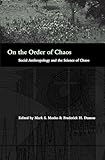On the Order of Chaos : Social Anthropology and the Science of Chaos / ed. by Fred Damon, Mark S. Mosko.
Material type: TextPublisher: New York ; Oxford : Berghahn Books, [2005]Copyright date: ©2005Description: 1 online resource (296 p.)Content type:
TextPublisher: New York ; Oxford : Berghahn Books, [2005]Copyright date: ©2005Description: 1 online resource (296 p.)Content type: - 9781845450243
- 9781800735187
- 306/.01
- GN345 .O5 2005
- online - DeGruyter
| Item type | Current library | Call number | URL | Status | Notes | Barcode | |
|---|---|---|---|---|---|---|---|
 eBook
eBook
|
Biblioteca "Angelicum" Pont. Univ. S.Tommaso d'Aquino Nuvola online | online - DeGruyter (Browse shelf(Opens below)) | Online access | Not for loan (Accesso limitato) | Accesso per gli utenti autorizzati / Access for authorized users | (dgr)9781800735187 |
Frontmatter -- CONTENTS -- FIGURES AND TABLES -- LIST OF CONTRIBUTORS -- PREFACE AND ACKNOWLEDGMENTS -- PROLOGUE -- 1 INTRODUCTION: A (RE)TURN TO CHAOS Chaos Theory, the Sciences, and Social Anthropological Theory -- 2 FROM LÉVI-STRAUSS TO CHAOS AND COMPLEXITY -- 3 FRACTAL FIGURATIONS Homologies and Hierarchies in Kabre Culture -- 4 “PITY” AND “ECSTASY” The Problem of Order and Differentiated Difference Across Kula Societies -- 5 FRACTALITY AND THE EXCHANGE OF PERSPECTIVES -- 6 FLUIDS AND FRACTALS IN RWANDA Order and Chaos -- 7 PEACE, WAR, SEX, AND SORCERY Nonlinear Analogical Transformation in the Early Escalation of North Mekeo Sorcery and Chiefly Practice -- 8 AFTERWORD Order is What Happens When Chaos Loses Its Temper -- BIBLIOGRAPHY -- CONTRIBUTORS -- INDEX
restricted access online access with authorization star
http://purl.org/coar/access_right/c_16ec
Over the past two decades, “chaos theory” – the perception of order previously hidden in phenomena of apparent randomness and disorder – has fundamentally transformed the natural sciences. In recent years, numerous scholars in the social sciences and humanities have attempted to adapt the insights of chaos theory to their studies of human cultural and social systems. Several of the world’s leading anthropologists, such as Roy Wagner, Marshall Sahlins, Marilyn Strathern, and Arjun Appadurai – have similarly drawn upon particular elements of chaos theory for their inspiration, but as yet there is no focused, comprehensive treatment of the applicability of chaos theory to anthropology’s distinctive ethnographic and cross-cultural materials. This edited volume fills the gap, with both accessible theoretical discussions of chaos theory applications in anthropology and detailed ethnographic and historical illustrations from Africa and Melanesia.
Mode of access: Internet via World Wide Web.
In English.
Description based on online resource; title from PDF title page (publisher's Web site, viewed 25. Jun 2024)


